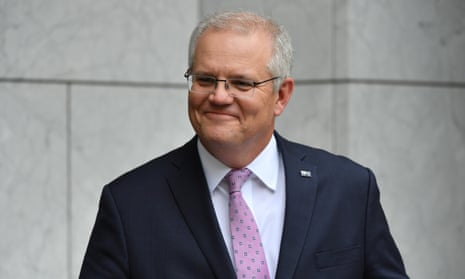Scott Morrison has signalled further tax relief for businesses as the income tax cuts and business tax concessions in Tuesday’s budget passed parliament after just three days.
More than 11 million Australians and 1 million businesses will begin receiving tax relief within weeks after the measures breezed through the Senate with Labor’s support on Friday.
However, a battle is brewing over the Coalition’s youth wage subsidy and the opposition’s $6bn childcare pledge announced by Anthony Albanese in his budget reply.
On Friday, Albanese continued making his case that the government had left women and older workers behind in its budget, while Morrison hinted at a possible reduction in the corporate tax rate in the next stage of Australia’s recovery from the Covid-19 recession.
Under the now-legislated tax package, people earning $48,000 to $90,000 will gain an extra $1,080 in 2020-21 from a one-off extension of the low and middle-income tax offset.
People earning more than $120,000 will see the biggest benefit, with a permanent cut of $2,430 in 2020-21 and beyond.
Businesses can look forward to the ability to claw back tax already paid against losses to June 2022 and to deduct the full cost of capital assets purchased after budget night and first used or installed by 30 June 2022.
At a press conference in Canberra, Morrison told reporters the measures “mean more jobs” and “real change” to tax laws had been achieved in just three days.
After months of Labor accusing the government of having no comprehensive jobs plan, Morrison retorted that the budget was “the plan that Australians have needed”.
“Australians can go into this weekend … knowing that our plan for the economic recovery from the Covid-19 recession is moving. It’s happening. It’s law.”
Asked if more permanent changes were needed, Morrison replied that the government’s economic response had come in three stages from “cushioning the blow”, to the budget’s plan to help “bring forward” decisions to hire and invest, to a third stage to “build for the future”.
Morrison pointed to existing measures including the $2bn research and development tax concession, $1.5bn manufacturing plan and the energy plan to increase gas-fired electricity.
“And we’ve always been a government … about getting taxes low. Lower taxes has always been part of our economic plan, and we will never lose our passion for lower taxes.”
Although Labor helped pass the government’s tax bill, it is more sceptical about the jobmaker hiring credit because it only provides subsidies to employ those aged 35 and under. The Senate has referred the hiring credit bill to an inquiry to report by 6 November.
In his budget reply on Thursday, Albanese promised a $6bn overhaul of the childcare subsidy system and to create a $20bn corporation to build electricity transmission infrastructure to prepare Australia’s power grid for renewables if Labor wins the next federal election.
By removing the $10,560 childcare subsidy cap and lifting the maximum childcare subsidy rate from 85% to 90%, Labor says it will help 97% of families using childcare save between $600 and $2,900 a year.
At a doorstop on Friday, Albanese said that women had been “disproportionately affected by the pandemic” but were a “footnote” in Tuesday night’s budget.
“What our childcare announcement is about is participation of women in the workforce and also about boosting productivity,” he said.
Albanese said the budget would result in Australia’s public debt reaching $1tn but claimed it contained “no plan for the economy, no plan for the future, [and] no plan for serious job creation”.
“Labor wants to create wealth and we are unashamed about that.
“We want to create wealth but we want to see it then shared fairly. And we want it shared among men and women.”
Morrison said Albanese still had questions to answer on the details of the policy, and attacked Labor’s intention to investigate providing a 90% subsidy for all childcare regardless of family income.
“What I do know is that someone who is in the top 10% of income earning in this country are the big beneficiaries of that plan,” he said.
Morrison and the finance minister, Mathias Cormann, said before the pandemic Australia had record women’s participation in the workforce and childcare costs had begun to decline.
In fact, childcare fees had increased by 3% in the last quarter of 2019 and by more than 34% since the Coalition was elected in 2013.
Despite the government recording a deficit of $213.7bn this year and abandoning the intention to pursue a surplus until unemployment is comfortably below 6%, Morrison accused Albanese of adding to proposed spending without identifying savings.
“The leader of the opposition criticises the level of debt and the level of deficit, but then proceeded to add to both of them last night.”
